
How Can Philanthropy Build Stronger, Resilient Communities?
In This Issue
Highlights from Global Conference
What’s Next for Philanthropy? Program Highlights
New Research and Resources
In this quarter’s issue, we’re highlighting the latest themes and learnings from Milken Institute Strategic Philanthropy as we look back at the Milken Institute Global Conference. Follow Milken Institute Strategic Philanthropy on LinkedIn for more.
Highlights from Global Conference
Our key theme kicking off this year’s sessions: strengthening communities. When rapid change causes turmoil and upheaval, turning toward our communities—locally and globally—can offer a place to belong and a unified front to face whatever comes next. Philanthropy, alongside companies and foundations, can—and must—work in unison to ensure that individuals are thriving, and that communities are resilient and ready for the future. We discussed this in full detail during our opening plenary session with leaders across corporate philanthropy, where we explored the unique challenges, emerging opportunities, and new strategies in delivering impact to stakeholders.
Fact or Fiction: Fostering Trust in Science
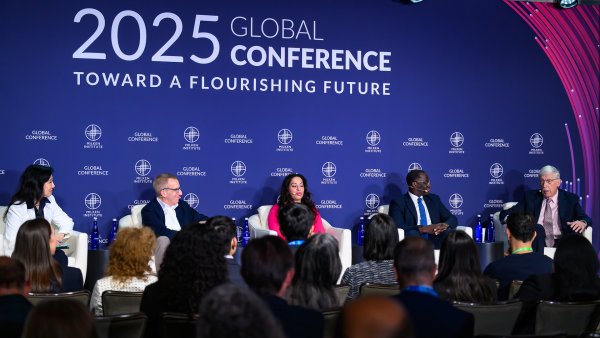
(Left to right) Alice Park, TIME; Rick Berke, STAT; Seema Yasmin, Stanford Health Communication Initiative; Joel Bervell, The Dose; and Francis Collins, formerly of the National Institutes of Health
In response to widespread skepticism and misinformation about science and health, respected science and health leaders from media, research, and government shared strategies to help communicators humanize and personalize their science- and health-related messages, and help listeners assess the veracity of information.
The Next Frontier: Milken-Motsepe Prize Award Ceremony
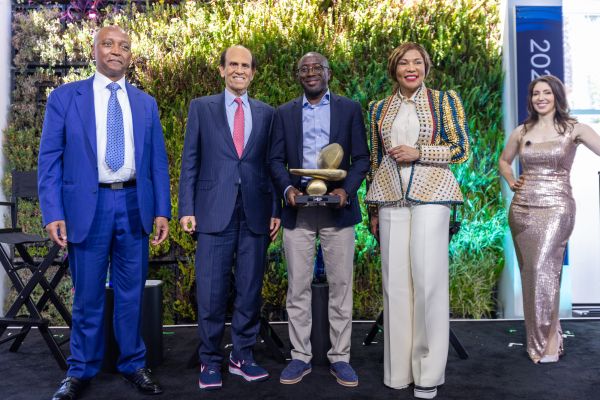
(Left to right) Patrice Motsepe, Africa Rainbow Minerals; Michael Milken, Milken Institute; Ola Oyetayo, Verto; Precious Moloi-Motsepe, Motsepe Foundation; and Emily Musil, Milken Institute.
Congratulations to Verto, Grand Prize Winner of the $1 million Milken-Motsepe Prize in FinTech! Launched in May 2024, the Milken-Motsepe Prize in FinTech attracted more than 3,000 entrepreneurs from 126 countries across six continents.
Verto will use the winnings to further their product and continue to invest in financial inclusion in Africa, with plans to grow their cross-border payments platform for businesses, which eliminates intermediary fees, handles 49 currencies, and settles transactions faster. Alongside Verto, we celebrated FinTech finalists, Chumz and Oze, who received $100,000 to advance their innovations at our must-see award ceremony.
Launching a New $2 Million in Total Prizes AI and Manufacturing
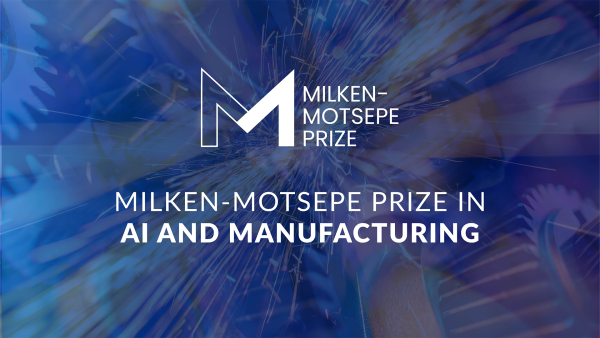
Applications for $2 million in total prizes, including a $1 million Grand Prize, are now open until July 31! This competition calls on bold innovators who are revolutionizing manufacturing value chains across Africa by leveraging AI and other advanced technologies. Learn more about this prize and apply now.
Watch all the philanthropy-focused panels here.
What’s Next for Philanthropy? Program Highlights
Transformational philanthropy requires a multilevel approach to creating positive impact by addressing challenges for individuals, our communities, and our planet. Driving systemic change includes thoughtful strategies to engage at all three levels—from personalized care for individuals affected by brain disorders, to better supporting veterans and their families in transitions to civilian life, to addressing climate challenges with new, innovative methodologies.
Learn how the Strategic Philanthropy team is approaching this work with deeper insights from Global Conference and updates from our latest initiatives.
The Future of Individualized Care: A Spotlight on Precision Brain Health
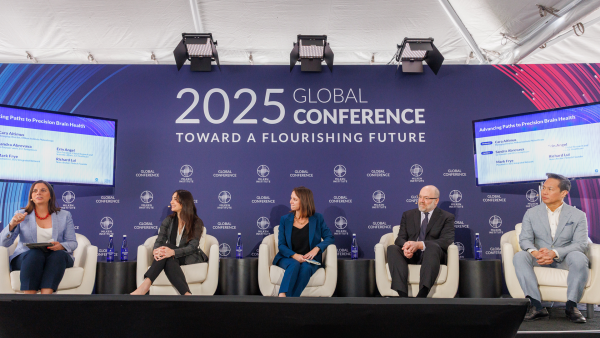
(Left to right) Cara Altimus, Milken Institute Strategic Philanthropy; Sandra Abrevaya, Synapticure; Erin Angel, GE Healthcare; Mark Frye, BD2 Integrated Network; and Richard Lui, news anchor, FinTech founder
For individuals with brain diseases and psychiatric conditions, blanket, one-size-fits-all remedies cannot treat most people effectively, leaving many with delayed diagnoses or ineffective treatments. There is a clear need for a tailored approach to patients that is inclusive and patient-centered. Leaders in tech and medicine joined forces on this panel to stress the imperative to use advances in personalized data to provide better diagnoses and tailor care for everyone affected by brain disorders.
Learn how philanthropy is driving advancements in science and health care by exploring our recent work:
- Investing in Collaboration: SPARC’s BD2 a bipolar-disorder initiative focused on advancing research and care for the condition, gathered its funded researchers to share what’s working, what’s not, and what’s next. Additionally, this initiative has announced that four institutions will receive $2.3 million each to join the BD2 Integrated Network, a collaborative research and clinical care model.
- As lifespans in the US increase, the need to invest in research that enables personalized, whole-brain care is apparent. Learn more about the Institute’s contributions to brain health in Worth Magazine’s May issue.
Supporting Community Well-Being: A Spotlight on Military Service Members
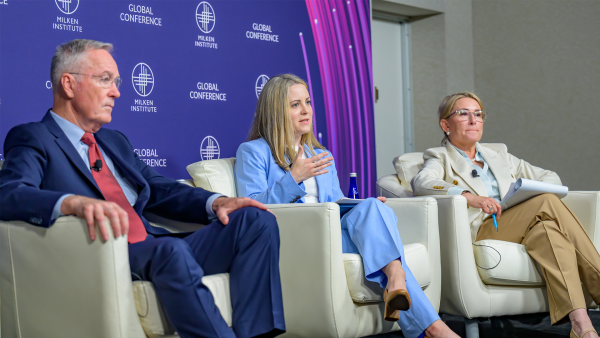
(Left to Right) Joe Dunford, Liberty Strategic Capital; Sylvie Raver, Milken Institute Strategic Philanthropy; and Wendi Safstrom, SHRM Foundation
With approximately 16 million veterans living in the United States, military families are vital members of communities across the nation. Yet persistent challenges—particularly in housing, health care, and employment—can complicate the transition to civilian life. A panel of experts in military and veterans’ affairs advocated for an intersectional and holistic approach to ensuring prosperity for those who have served.
Where can philanthropy step in?
- There are clear opportunities to fill systemic gaps—targeted philanthropic investments can deliver outsized impact in areas such as mental health, social services, and employment. Read more about our Veterans Community Initiative.
- A public report scheduled for release in the summer of 2025 will provide an overview of the landscape and philanthropic opportunities to better support veterans, their families, and the veteran support ecosystem at large.
Building a Thriving Ecosystem: A Spotlight on Oceans
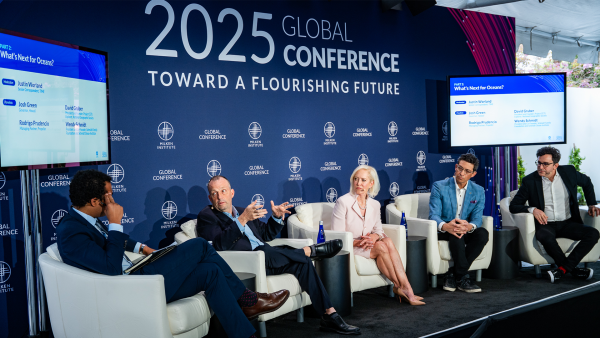
(Left to right) Justin Worland, TIME; Josh Green, governor, State of Hawaii; Wendy Schmidt, Schmidt Family Foundation, Schmidt Ocean Institute; Rodrigo Prudencio, Propeller; David Gruber, Project CETI, National Geographic Society
At the macro level, the health of our planet—its oceans, forests, and food systems—is essential to community resilience and individual well-being. As climate challenges intensify, philanthropy has a vital role in catalyzing innovative, scalable solutions. Members of this oceans-focused panel explore emerging approaches to conservation, demonstrating how philanthropic capital can accelerate sustainability efforts and empower the next generation of marine leaders and advocates.
Only 2 percent of philanthropic contributions are directed toward climate mitigation. How can strategic giving maximize impact?
- We highlight four strategic areas where philanthropic capital can help remove financial and logistical barriers, scale proven solutions, and create new opportunities to address climate challenges. Read our 10 recommendations for philanthropic investors.
- In a recent episode of Mission Matters, John Schellhase, director, Strategic Philanthropy, breaks down the role of philanthropy in addressing climate and environmental challenges. Listen to the full episode.
New Research and Resources
Advancing Africa’s Digital Economy: A Prize in FinTech to Advance Financial Inclusion
Prizes are powerful tools for philanthropists to spark breakthrough ideas in emerging fields. This report explores Africa’s FinTech landscape, unpacks the prize design process, and offers insights for funders seeking innovative approaches to drive social impact.
Building Tomorrow’s Workforce: Reimagining Systems Change for an AI-Driven Economy
By 2027, AI and automation will disrupt 85 million jobs and create 97 million new ones requiring entirely new skills. How can we ensure that economic mobility keeps pace with this rapid change? Read more from Michael Ellison, CEO, CodePath.
Values-Driven Giving and Investment: Lessons from Big Shoulders Fund Honorees
Kent and Liz Dauten, founders of the inaugural BD2 funder, the Dauten Family Foundation, share their values-driven philanthropic strategy in Better Magazine.